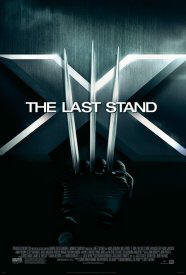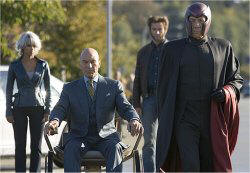|
X-Men: The Last Stand Reviewed by Rich Drees
Following the events of the last film, the President of the United States has created a Cabinet-level position to deal with mutant affairs which is filled by former X-Men Dr. Hank “Beast” McCoy, who learns that a pharmaceutical company has discovered a way to suppress the gene that gives mutants their powers. Knowing the potential political bombshell this could become, McCoy informs Professor Charles Xavier (Patrick Stewart), headmaster of a school for mutants and organizer of the film’s titular superhero group. When the news of this “cure” is announced to the general public, public opinion is expectedly divided, with the most extreme reaction coming from mutant-rights terrorist Magneto (Ian McKellen) who begins to raise an army to destroy the source of the cure.
Incoming director Brett Ratner has been, at best, a journeyman director. He knows in which direction to point the camera and can occasionally construct serviceable action sequences. Brought in at short notice mere weeks before the film began shooting, Ratner does what he can to deliver to an action-filled adventure that would further expand the world and themes set up in the previous two pictures. Unfortunately, while the movie does deliver numerous action scenes of escalating mayhem and destruction, the thrills are hollow and carry little resonance.
But the blame for X-Men: The Last Stand’s failings lie not
with its director, but with its script. Frustratingly, character
moments are glossed over in the rush to get to the action sequences.
What moments the film does devote to characterization comes off
stilted, featuring wooden dialogue that even experienced actors the
likes of McKellen and Stewart seem adrift, leaving the film’s vox
humana-laden soundtrack to cue the audience to the story’s
emotional moments.
The first two X-Men pictures carried a subtext that demonstrated that comic-book adaptations can be more than just brainless summer action films. The differences between Xavier’s and Magneto’s philosophies paralleled those between Rev. Martin Luther King Jr. and Malcolm X. Previous director Singer also wisely added a more current allegory in equating the struggle for mutant rights with that for gay and lesbian rights. The new film’s plot does offer instances where these themes could be further explored. Unfortunately, the script decides to ignore these opportunities for thematic development and instead attempts to hijack the Spiderman films’ ethical concerns about great power and responsibility. Regrettably, the screenplay does so in a rather cursory and ham-fisted manner.
Die hard fans of the comics will undoubtedly find the film a frustrating experience. Several new supporting characters make their first cinematic appearance in the film, though most of these appearances are relegated to mere throwaways. Also, the resurrection of Jean Grey (Famke Janssen), who perished in the last film, and her transformation into the Phoenix is one of comics most epic and iconic stories, spanning interstellar empires and operatic tragedy. Here, though, it has been relegated to subplot status, comprising barely 20 minutes or so of the film’s running time. The film tries to cram so much onto its canvas that it becomes to busy and unfocused for its own good.
At its core, X-Men: The Final Stand is a rousing adventure, but nothing more. And considering the previous films’ depth, this comes as nothing less than a disappointment. |
 The first two cinematic X-Men comic book adaptations
surprised critics and audiences not only with their faithfulness to
their source material, but with their intelligent treatment of that
material in translating it to the silver screen. Credit for this can
be laid at the feet of the films’ director Bryan Singer, who
realized that the comic’s race relations allegory would make for a
dramatic backdrop for its story of clashing super-powered mutants
with differing opinions on how to best integrate themselves within
normal, non-super powered society. However, when Singer was lured
away from the franchise to oversee the film revival of comics’ most
recognizable character, Superman, fans were concerned that
anyone sliding into the director’s chair to oversee a third
installment would not be able to live up to the standards of the
first two films. Sadly, these fears have some true.
The first two cinematic X-Men comic book adaptations
surprised critics and audiences not only with their faithfulness to
their source material, but with their intelligent treatment of that
material in translating it to the silver screen. Credit for this can
be laid at the feet of the films’ director Bryan Singer, who
realized that the comic’s race relations allegory would make for a
dramatic backdrop for its story of clashing super-powered mutants
with differing opinions on how to best integrate themselves within
normal, non-super powered society. However, when Singer was lured
away from the franchise to oversee the film revival of comics’ most
recognizable character, Superman, fans were concerned that
anyone sliding into the director’s chair to oversee a third
installment would not be able to live up to the standards of the
first two films. Sadly, these fears have some true.